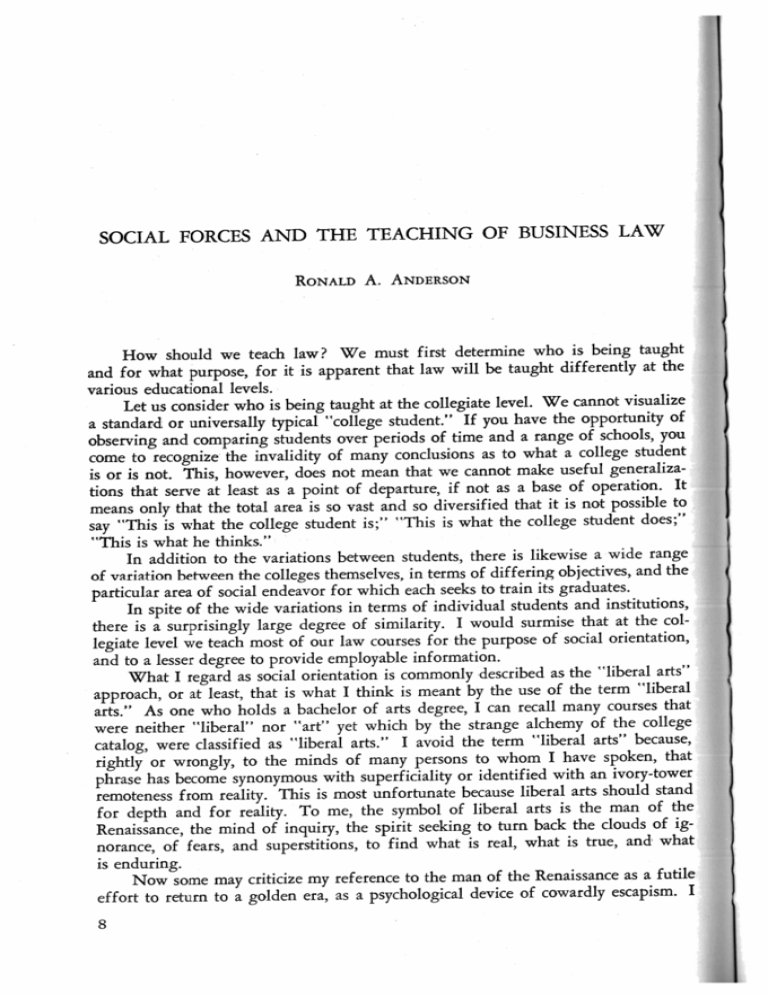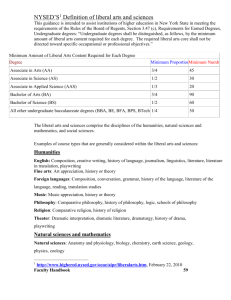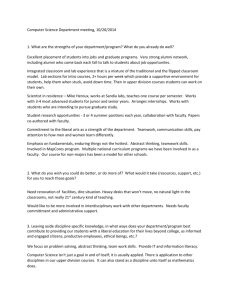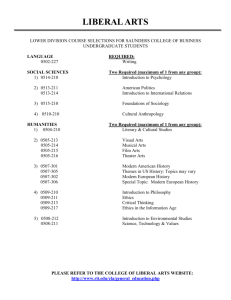social forces and the teaching of business law
advertisement

SOCIAL FORCES AND THE TEACHING OF BUSINESS LAW RoNALD A. ANDERSO N How should we teach law? We must first determine who is being taught and for what purpose, for it is apparent that law will be taught differently at the various educational levels. Let us consider who is being taught at the collegiate level. We cannot visualize a standard or universally typical "college student." If you have the opportunity of observing and comparing students over periods of time and a range of schools, you come to recognize the invalidity of many conclusions as to what a college student is or is not. This, however, does not mean that we cannot make useful generalizations that serve at least as a point of departure, if not as a base of operation. It means only that the total area is so vast and so diversified that it is not possible to say "This is what the college student is;" "This is what the college student does;" "This is what he thinks." In addition to the variations between students, there is likewise a wide range between the colleges themselves, in terms of differing objectives, and the variation of particular area of social endeavor for which each seeks to train its graduates. In spite of the wide variations in terms of individual students and institutions, there is a surprisingly large degree of similarity. I would surmise that at the collegiate level we teach most of our law courses for the purpose of social orientation, and to a lesser degree to provide employable information. What I regard as social orientation is commonly described as the "liberal arts" approach, or at least, that is what I think is meant by the use of the term "liberal arts." As one who holds a bachelor of arts degree, I can recall many courses that were neither "liberal" nor "art" yet which by the strange alchemy of the college catalog, were classified as "liberal arts." I avoid the term "liberal arts" because, rightly or wrongly, to the minds of many persons to whom I have spoken, that phrase has become synonymous with superficiality or identified with an ivory-tower remoteness from reality. This is most unfortunate because liberal arts should stand for depth and for reality. To me, the symbol of liberal arts is the man of the Renaissance, the mind of inquiry, the spirit seeking to turn back the clouds of ignorance, of fears, and superstitions, to find what is real, what is true, and what is enduring. Now some may criticize my reference to the man of the Renaissance as a futile effort to return to a golden era, as a psychological device of cowardly escapism. I 8 SOCIAL FORCES AND THE TEACHING OF BUSINESS LAW dispute that because I see no turning back when I place myself by the side of the man of the Renaissance. What has changed since his time and ours ? I know that there has been revolution upon revolution in the field of material things and of science. I am fully aware of the fact that today I can run you over at the corner with my swift automobile, of many horsepower, whereas five centuries ago I could only run over you with my swift horse, of one horsepower. I am aware of the fact that in those past eras I could kill you with a cross-bow of limited range whereas today I have long range missiles and can call upon the power of the atom to do the trick on a more efficient scale than ever terrified the mirid of Dante. But, if you think that the basic issues of the world, as distinguished from its physical trappings and instrumentalities, have changed to any great degree from the days of the Renaissance, I submit that your TV aerial has blown down and that you have not received any local, national, or world news for the last twenty years. Science and invention have changed-but has man? Suppose that this afternoon, we all took a ride in a super-rocket, orbited the earth a while, toured the realms of outer space, and then returned: to this room. Would we be any different than we are? I would. I would be scared silly. But apart from that, I am afraid that I would still be the same me. In spite of the great tour of the majestic universe, in spite of that trip which would make the sun-god Apollo's circuit look like going to the corner store for cigarettes, I am pretty much afraid I would still be me; my problems in life would be the same; I would not have changed. Do not think that I speak in terms of despair or of any desperationist philosophy, such as that of Chateaubriand's fin de siecle or of that of the beatniks and the existentialists. I believe that man can change, that he can be elevated, and that he can be ennobled. I merely refuse to accept material change as the criterion. In spite of all, man's great problems are still his relationship to God and his relationship to other men, individually as persons, and collectively as groups and nations. The problems have remained the same and if anything, their solution has but become the more difficult, for there are now more material things to desire; the economic interdependence of the individual has intensified his problems; while modern science has removed the protective buffers of space between nations. That more progress has not been made in the problems of relationships is not surprising when we recognize the distinctive character of learning in those areas. In the field of science, mathematics, and all the areas of learning based upon the compilation of data, each generation can stand upon the shoulders of the past. The medical student does not have to rediscover the circulation of the blood; he can accept it as a fact. The astronaut does not have to rediscover the course of the planets; he can accept it as a fact. Our young engineer does not have to stay under an apple tree in the hope that the force of gravity will be manifested to him. Contrasting all this with the field of spiritual and human relationships. Can you hand a book to a child and impart to him the depth of understanding and appreciation which years of experience have built in your mind? Of course, you can do much toward directing him to think of such things and to lay the ground work for his thinking, but can you give him your understanding and beliefs? Did your parents and your teachers succeed in giving to you their understanding and their beliefs? They gave you a most valued direction, but beyond that-it was the passing 9 AMERICAN BUSINESS LAW ASSOCIATION BULLETIN years and all that those years brought with them that has given you your presentday maturity. If you give school children a vocabulary test, you will undoubtedly find that many, many children can give you a satisfactory definition of God, of truth, of friendship, of honor, of tears, of sorrow, of death, of work, of happiness, of success. But how many slings and arrows of outrageous fortune must be borne-how many tides in the course of human events must ebb and flow-how much of life must be lived-before the full meaning, the real significance of those words will come home to them? It might not be far from the truth to say that maturity is really understanding what the definitions in the dictionary mean. The sorry fact is that just about the time a given generation has reached the maturity which would enable it to progress in the solution of the basic social problems, its allotted years expire. The new generation which follows is not able to start where the preceding generation stopped. While it is true that one generation overlaps another, the general characteristic is that the new generation is still years behind the former generation at the time when it should be along side of it to take over and continue the work. By the time it is qualified for that task, another new, relatively immature generation is taking over. A generation which as of yet has not lived enough of life to have learned as fully and with as much conviction the lessons which the parting generation had learned. Thus by the time each new generation has become an old and wiser generation, it finds that it must surrender the reins of leadership to a new generation. Again let me stress that I am not a defeatist. I recognize that progress is being made in the field of human affairs. I know that it can be made. But I recognize how slow that progress has been. When we realize that six long centuries had to drag past King John and Magna Carta before the great idea of democracy would be dreamed and would become a reality, we recognize the slowness of the process of improvement. Society to advance itself, yes, even to save itself, must in some manner accelerate this process of the solution of relationship problems. And you and I, as teachers, have both the opportunity and the responsibility of accelerating the maturing of our students so that each new generation is more and more nearly prepared for the problems of life and the world, and does not go forth to repeat the errors of the past. As part of this plan of teaching for life and living, I want to teach law so that the student will recognize it for what it is: rules created by society by which society at the time wishes itself to be governed-rules which society adopts because those rules advance or further or protect certain interests which society at the time holds dear-rules which society can modify, change, and even throw away when they no longer serve the purpose of society. I would have the student recognize that there is no such thing as total security for the individual in our socio-legal systems, or, for that matter, in life itself. No one can be absolutely certain of what will happen to him or to his affairs ten minutes, ten days, or ten years from now. I want my students to recognize that change and insecurity are the characteristics of man's activities. I want them to recognize this, not for the purpose of frightening them, or to cause them to despair, but so that they can learn to face the uncertainties 10 SOCIAL FORCES AND THE TEACHING OF BUSINESS LAW and the unknown with courage; so that they will prepare themselves both spiritually and intellectually for meeting whatever the future brings. I want to impress upon the student that he cannot place a blind trust in the "legal system" and just go on year after year assuming that the law will always be right and will always do the right thing by him. I want him to know that law is a variable and that it does not provide total and unchanging security. As a businessman, he should, of course, appreciate the hazards and the uncertainties of litigation and the legal system. But most of all, as a citizen, he must grow to accept his responsibility to see that the legal system, and I use that term in its fullest meaning to include governmental law as well as private citizen law, shall not change in a way harmful to the basic American principles. As a voter, he must accept his responsibility for the quality of our laws and his duty in the selection of the men who interpret and enforce them. As a member of society, he must recognize that the natural characteristic of law and all human relationships is to change and that he cannot sit idly by and expect things to take care of themselves. I make no claim to originality in teaching law in such a way as to show that it is the product of social forces. At least two hundred years old must be the maxim that "he who knoweth not the reason for the law, knoweth not the law." Many have deplored the teaching of law as mere fixed rules. Of necessity every teacher will find himself virtually forced to discuss the social factors that gave rise to the rule of law. For example, who can teach the exceptions to the requirement of consideration without being compelled to answer in terms of social forces why a charitable subscription is binding without consideration; why promissory estoppel is sometimes binding; and why a "firm offer" is really firm in some states and under the Uniform Commercial Code? Try as you will, you find yourself driven to share with the students the great secret that various social forces are gradually eroding the role of consideration which one remote century had thought was the perfect rule. Similarly, the question of the relative rights of the owner of goods and the purchaser in good faith from the thief demands, not a weighing of dry, lifeless rules, but a recognition of a great and irreconcilable conflict between the concept of stability of title and the concept of furtherance of trade. The same is true of the law of impostors and forgeries in connection with negotiable instruments. And again, can you avoid discussion of the endless conflict between the quest for stability and the quest for freedom of action when you teach the rules of law relating to the validity of restrictive covenants of employees not to compete, agreements of buyers to maintain prices on resale, combinations in restraint of trade, restrictions on the alienation of property, and covenants running with the land? And yet again, can the student appreciate the parol evidence rule or the statute of frauds until he understands the social problem of perjury and the imperfect character, when compared to laboratory techniques, of any man-administered legal system? Obviously, different rules and areas of law lend themselves in varying degrees to an examination of the social forces which gave rise to them. The personal interests of the teacher, the time at his disposal, the material which must be covered in the term, the level of understanding of his students--are all factors which will influence the extent to which the teacher will give emphasis to the social forces which 11 AMERICAN BUSINESS LAW ASSOCIATION BULLETIN make the law. The level of the course is also most significant. When the student is beginning the study of law, it is necessary to place emphasis upon the social forces because their existence and operation are new to the student's thinking. As the student advances with the study of law, or as he takes more specialized courses, he will be able to make the analysis for himself and the teacher can concentrate more on the rules of law rather than the process that created them. A number of advanced law courses come within the classification of imparting employable information. In a number of larger cities a course in negotiable instruments or in real estate law is designed to give the student specific knowledge which he can utilize in his employment. In such a course there is a tendency to concentrate so much on the rules of law themselves that the reasons for the rules tend to be slighted. Thus, if your student is studying negotiable instruments and it is likely that he is going to be employed in a bank handling such instruments, it becomes vital that he know the rules of law as an operational guide: whether he knows why that guide exists may not be commercially important. Even here, however, it will be found that student interest is greater and that the student can understand and absorb the rule of law better if he understands why the rule of law is desired and the factors which caused it to evolve. What are the social forces which make the law? First, of course, is the objective of the state or government to protect itself, as by laws against treason, or laws requiring military service. Less dramatic are the laws that preserve the existence of government by imposing the taxes to finance its operations. Through the fabric of the law run the threads of protection of the public health, safety, .and morals; protection of the person from injury and of his property from harm; the protection of title to property; the preservation of the freedom of action of the individual and the free use of his property; the desire of society to carry out or give effect to the intent of the parties, but at the same time to protect from exploitation, fraud, and oppression; to further trade; to give protection to the creditor, and at the same time provide for debtor rehabilitation; and over all, to preserve stability in spite of change, and to provide a system which is practical. Part and parcel of the recognition of the significance of these social forces is the appreciation that the forces may be in conflict with each other; as in the case of a limitation placed on one person, thereby limiting his freedom of action or the free use of his property, in order to protect others from fraud or oppression. When the student is able to set the rule of law against the background of the social forces and the conflict of social forces, the rule of law takes .on a fuller meaning and the student understands that much better both the rule itself and the society in which he lives. To illustrate: the complexities of sales warranties are simplified and made more comprehensible when placed in the context of the changes in the economy; of the changes in our daily way of life. The student will see that when the economy was patterned on a local community unit in which everyone knew each other and each other's product, the concept of "let the buyer beware" expressed a proper basis on which to conduct business and was not a license for ruthlessness and deception by vendors. Much of the early law of sales the student will see was predicated on what was then the sound philosophy of that maxim. In today's economy, however, 12 SOCIAL FORCES AND THE TEACHING OF BUSINESS LAW with its emphasis on interstate, national, and even international activities, the buyer, at least at the consumer level, has little or no direct contact with the manufacturer or seller, and the packaging of articles generally makes their presale examination impossible. Under these circumstances the consumer has been forced to rely on the integrity of others to an increasing degree. Gradually the law changed to protect the buyer by warranties when his own caution could no longer protect him. It changed because society was not willing to continue to do business as usual. For the student to see the law of warranties as an aspect of a changing economy gives him an insight into the economy itself and the processing, packaging, and distribution techniques that science has made possible; an insight into the phenomenon of his society's gradually arousing to the need of protecting buyers from exploitation and of protecting the public health from harm ; an insight into the conflict of social philosophies, as "let the buyer beware" does battle with the concept of "protect the buyer;" and finally an insight into the way in which new laws are developed and old laws changed to meet the new situations that arise. To the extent that the student can analyze law as the product of man's striving for justice in society, he will have a greater insight into the law, into society and the world in which he lives, and into the mind and heart of man. To that extent, the student will leave the course a more nearly mature person. To that extent, a greater contribution to the progress of society has been made. 13







